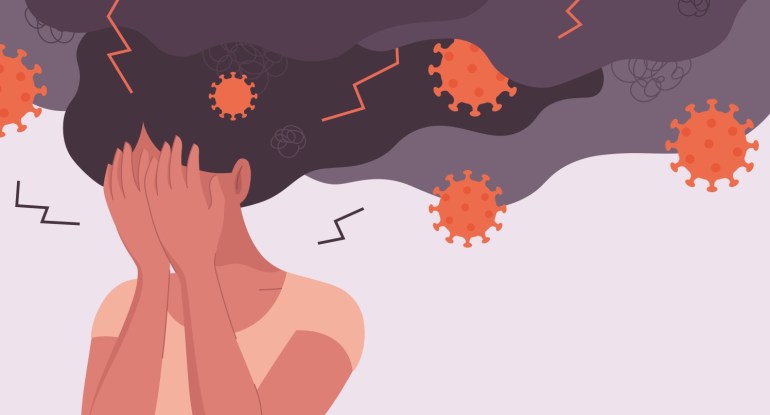Even as COVID restrictions start to lift, many of us are struggling with feelings of despondency. Emmy and AACTA Award-winning producer turned screen sector executive coach Ellenor Cox provides four strategies for a pick-me-up.
As we inch towards the 80 per cent double vaccinated milestone, we are starting to see light at the end of the tunnel of this interminable winter of lockdown.
Rather than a collective sense of excitement however, what I’m noticing in comparison to our 2020 lockdown experiences is a much greater sense of resignation and despondency.
This ‘COVID Fatigue Syndrome’ comes about because of how draining the feeling of frustration can be, and there’s many reasons for this. Perhaps if there’d been different quarantine and vaccination policies, then Australia could still be carrying the banner as a world leader in offering Covid-safe filming environments. Perhaps if border closures and hot-spot restrictions hadn’t been so reactive, then our shoots may have gone more smoothly. This frustration, whether it’s conscious or subliminal, can play a corrosive role in undermining our resilience and stamina, as it’s a loss that’s very tangible and real.
Damned if you don’t and damned if you do
This sense of despondency that I’m describing seems to be settling into two different camps at the moment.
One the one hand there are those who – while still fortunate to be working – are feeling exhausted and defeated by the endless schedule shifts, budget overages, last minute shoot changes and the additional hours have been needed to cope with snap lockdowns, sudden border closures or close contact 14-day isolation regimes. Without the ‘pick me up’ of a catering truck buffet or production office end of week drinks, then life on set and in production can feel like a grind.
Then there are those who felt compelled to return to ‘Covid-Safe’ Australia last year, leaving behind burgeoning or established careers overseas, who are now be dealing with the isolation of almost zero networking events and a limited range of production opportunities.
This inability to network and the reality of a shrinking sand pit, filled with increased players, means that those currently not working feel more isolated and defeated than perhaps ever before.
With so many things out of our control and compounding this sense of despondency, it’s crucial to place our focus on the area of our lives we do have the ability to take some ownership over. It’s also critical for motivation – a possible vision of the not-to-distant future gives us something to lean into.
Below are four key tactics and strategies that require no more commitment than time, and will allow you to balance the scales back towards the direction of feeling more in control, less despondent and more invigorated about the future ahead. Creating daily habits in any or all of these areas will be what will get us through to the point where our screen lives have returned to a ‘Covid normal’ that becomes manageable.
1. Gratitude & Appreciation
Gratitude and appreciation are two of the most powerful emotions you can experience.
Next time you find yourself feeling flat, use your fingers and count out 10 things that you feel grateful for in that moment. Then count out a further 10 things that you appreciate that you’ve achieved for yourself or those around you that day. Nothing is too small to note, including that load of washing that you put through this morning!
2. Connection
As humans we are wired for connection and our need to feel a sense of belonging. A great daily habit to get into is to start the day by sending out a couple of notes of appreciation to colleagues and others in the industry.
Let them know how much you enjoyed their most recent film, or congratulate them on a recent funding announcement. Don’t add a ‘We must catch up for a chat soon’ line to these emails. Leave them truly unconditional in their intention and notice how you feel once they’re sent. This mood of positivity will permeate your morning’s activities whilst building up a bank of goodwill for future.
3 Self Care
If you’re in the camp with time on your hands, then create a series of daily non– negotiables around a variety of self-care activities such as exercise, conscious meal planning and creative pursuits.
If you’re feeling overwhelmed with the disruption that Covid is creating for your production then what are some tiny actions that you can take that symbolise self-care? Could it be as simple as switching to classical music rather than listening to the news or treating yourself to a series of healthy pre-prepared and delivered meals?
4 Mental Attitude
One of the most important areas that we have control over is our attitude in any given set of circumstances. We can choose a path of accountability for our thinking and actions or alternatively see ourselves as victims. To have this clarity we first need to have an awareness of what emotions are at play.
Next time you’re feeling triggered by something, practise the art of ‘the third thought’. Inevitably you’ll find that the first thought, or blurt, will be a defensive one. The second one is usually an accusatory one where we seek to place the blame on others. It’s only by the third thought that we’ve given our cognitive processes time to analyse the situation, label the emotion that’s triggered us and shift into a problem-solving mode that moves us in a more positive direction.
Each of these areas above have been chosen because the barriers to trialling them are almost non-existent and yet the results can be profound.
For more detailed strategies and insights on how creatives can cope with Covid download Ellenor’s free book ‘Hit the Refresh Button’ and set of worksheets ‘Hindsight 2020 |Vision 2021’ from her website www.ellenorcox.com
An original version of this story appeared in IF Magazine #202 (September-October).


